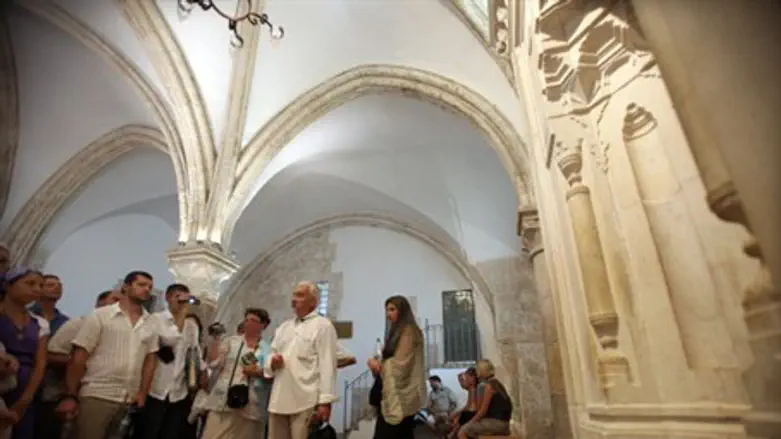
Hundreds of people participated in a traditional end of Sabbath Melaveh Malka event at the Tomb of King David, on Mt. Zion on Saturday night. The events have been going on quietly for the past year and a half, with word of the events spreading by word of mouth.
At this point, said Rabbi Eldad Shmuely, an organizer of the gathering, the weekly Saturday night gatherings attract hundreds of people on a weekly basis.
“Besides melaveh malka events, we also hold daily prayers and Torah classes here, in order to maintain a Jewish presence at this holy site,” Rabbi Shmuely told Arutz Sheva. “It is essential to maintain a Jewish presence here, in the face of claims of ownership by other groups. The only person who 'owns' this site is King David himself.”
Besides the Tomb, Mt. Zion is also home to a church, which claims ownership of the site. Several years ago, Jewish groups attempted to carry out improvements to the building, setting off protests from church leaders. More recently, the church requested permission from Israel to build a passageway through the Diaspora Yeshiva in order to enable visitors to more easily access a Christian site on the Mount.
“There is no doubt that the Christians want the entire Mount for themselves,” Rabbi Shmuely said. “We don't know what the government promised the Vatican during a meeting last week, when the latter asked to be able to carry out their construction work. We must actualize our rights at this site.”
Rabbi Shmuely said that the church has complained numerous times about the “noise” generated by the Melaveh Malka events. “It's absurd. The church makes noise every night, but during the times we celebrate they demand quiet, calling the police.”
He added that Mt. Zion was not the only place where Israelis and Jews needed to assert their rights. “The same thing is happening in other places, like the Tomb of Samuel. If Jews don't show that they care, these sites will be delivered into the waiting hands of foreigners, as has already happened on the Temple Mount.”
There is some disagreement about whether King David is actually buried at the tomb, but researchers agree that this is the site of the burial of important personages - possibly later kings of Judah.